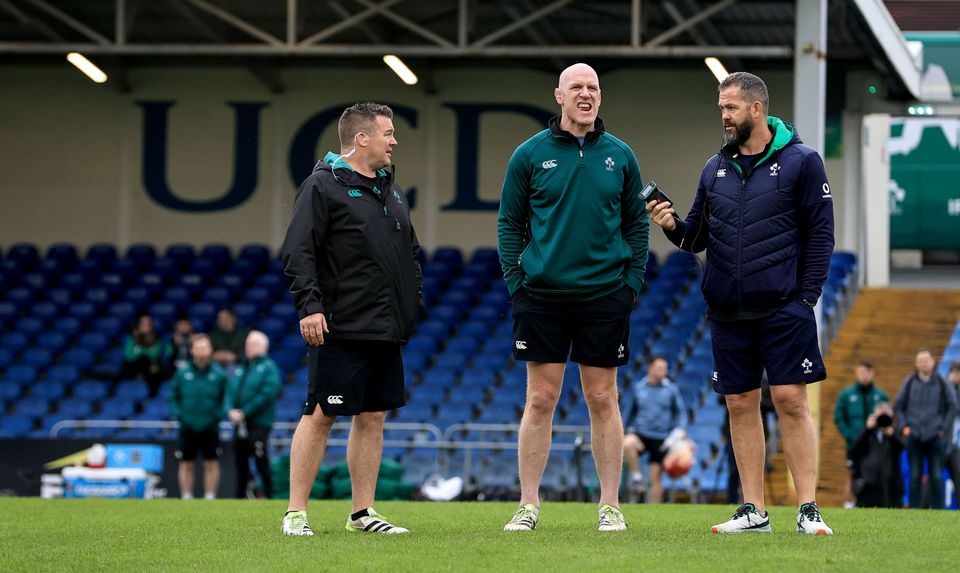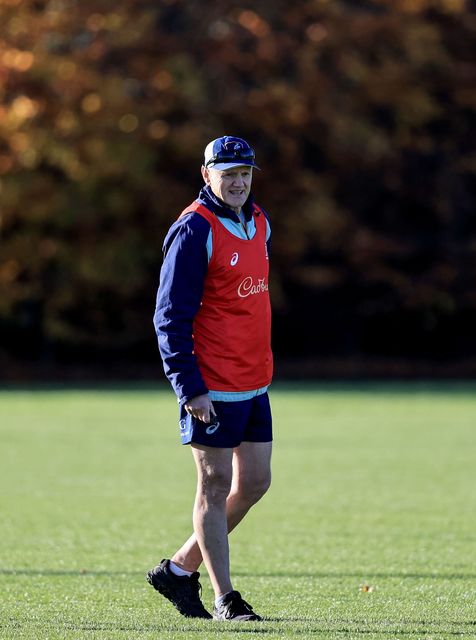It’s doubtful that Paul O’Connell has many regrets about his illustrious playing career, yet one suspects that he would have loved another few years playing for Ireland under Joe Schmidt.
As it was, O’Connell won two Six Nations titles in 2014 and 2015, with Schmidt in charge of Ireland before things went pear-shaped at the World Cup.
O’Connell’s days in the green jersey were numbered anyway, but when he ripped his hamstring off the bone during the final pool win over France, the writing was on the wall in more ways than one.
Schmidt went on to enjoy further success with Ireland, landing the Grand Slam in 2018, and while O’Connell watched from afar, having just started to dip his toe into the coaching world, he did so armed with many of the lessons he had learned from the Kiwi.
“I suppose I was older when Joe came to Ireland,” O’Connell reflects.
“I think one of the things he was good at is letting you know what he expected of you, then you could go and chase that down.
“You knew that if you delivered A, B and C, you had a good chance of being picked. I probably stopped trying to be a second-row that I saw on TV that was doing things really well and trying to copy that. I knew what I had to be good at. I really enjoyed that.
“He was very clear in how he coached. Coaching had moved on a lot, but we were still relying a little bit on emotion at times, whereas he was technically very good. Everyone talks about his detail.
“He has very good teaching principles. He wouldn’t just tell you what he wanted you to do; through the sessions, he would actually give you a pathway of how to change the habit or getting better at something. That was a really enjoyable aspect for me.”
Paul O’Connell (centre) is hoping to play his part in an Ireland victory over Australia
Taking the emotion out of certain situations is something that has stood to O’Connell because although his famous ‘manic aggression’ Lions speech may be mostly a thing of the past, the Limerick man has learned when and how to push the players’ buttons.
“You’re probably trying to give the players a nice, simple plan and some simple information that can help them do the job, but you’re trying to stay as clear as possible,” O’Connell explains.
“I think the emotion is probably the icing on the cake now, whereas maybe back in my day, it was the whole cake; we weren’t too worried about the icing!
“And listen, I think they’re playing for Ireland, the boys, you know, their families are in the crowd, they’re playing with their mates, they’re doing something they dreamed of, so the emotion is always there for them.
“They probably don’t need the likes of myself adding to it in any way. So, I think it’s something they’ve been really good at in recent years, managing that so it adds to their performance rather than maybe dulls their decision-making or dulls their ability to handle a big moment or dulls their ability to handle a mistake. I think they’ve gotten really good at that in recent years.”
Read more
Schmidt revolutionised Irish rugby, with O’Connell always fascinated with his detail around the breakdown, which is invariably where every game is won and lost.
It’s no surprise then that in his current role as Ireland forwards coach, O’Connell has adapted many of the philosophies that Schmidt implemented.
“Yeah, yeah, we would still do bits and pieces of what he had in place back in the day,” he says.
“Everyone is probably doing some kind of version of the same thing at the breakdown anyway, but we still have bits and pieces of the language that he used to use. That was a big part of how he coached.
“He was the first-ever coach, really, that I experienced that was very consistent in how he spoke about various parts of the game, and because of that, you had real clarity in what was expected in different parts of the game, and the ruck was no different.”
As for trying to get the better of Schmidt when he brings his Australia team to Dublin on Saturday, O’Connell is relishing the challenge.
“He’s an excellent coach. You cannot not work hard in a Joe Schmidt team,” he continues. “You’ll have a plan, and you’ll know inside out how to deliver that plan. When you have a team of good, talented players, that is half the battle.
“Be really clear on what your plan is and be really clear on how to deliver that plan. And Joe does that really well.
“You can see with this Australian team flashes of improvement all the time. To go to Twickenham and score as many points as they did, to play the game in the way they did, to keep coming back the way they did shows where their belief and resolve has gotten to. There will always be days like Scotland for every team.
“For us, it is a big challenge and part of that is knowing what they bring because Joe has coached us before.
“We know how clear he can be, and that clarity allows players to play with a lot of intent and a lot of physicality, so it is a big challenge.”
Joe Schmidt is aiming to inspire Australia to success at the expense of his former side Ireland
Getting one over on Schmidt is enough motivation in itself, but that this weekend is Andy Farrell’s last game as Ireland head coach before he departs on his Lions sabbatical has added another layer of intrigue ahead of Simon Easterby taking over on an interim basis.
“I think we know what we stand for, which is an important part of a team, that you know exactly what you want to do, you’re pretty clear on how you want to play the game, be it what you do at the ruck or what you do in defence or what you do in attack,” O’Connell adds.
“Then it’s just about getting more and more players comfortable with that, comfortable at delivering that, comfortable at driving that because every campaign we have, when we review it, we generally come away thinking that the ceiling is so high. It’s evolution, but it doesn’t need to be complicated for it to get better.
“In terms of our evolution, I think we’ve got some new players into the squad now, which is excellent. I think they’re very high-potential players. Hopefully, they can be guys now that make us better and improve us as we go along.”

